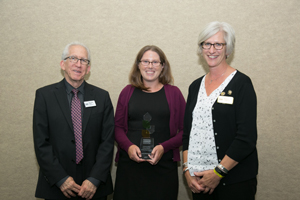 Northrop, assistant professor of literacy education at Cleveland State University, Ohio, is the recipient of the Outstanding Dissertation of the Year Award, honoring an exceptional dissertation completed in the field of reading or literacy. To learn about 2018 award and grant opportunities, visit our Awards & Grants page.
Northrop, assistant professor of literacy education at Cleveland State University, Ohio, is the recipient of the Outstanding Dissertation of the Year Award, honoring an exceptional dissertation completed in the field of reading or literacy. To learn about 2018 award and grant opportunities, visit our Awards & Grants page.
Laura Northrop brings a former journalist’s mind-set to the field of literacy research, where she approaches each challenge like a news story, seeking a deeply contextualized understanding of the reader’s world.
After a brief stint in journalism, Northrop decided she wanted to go into education. Her first teaching job was in the Chicago public school district. Although she taught grades 6–8, most of her students were reading below a middle school level. During this time, she became increasingly interested in struggling readers, particularly in the middle school context, and she decided to pursue a PhD in education policy analysis from the University of Pittsburgh.
“I wanted to know, what’s the difference between children who enter kindergarten with low-level literacy skills, and go on to have average achievement, and those who enter with low literacy skills and continue to struggle?” Northrop recalls. She explored this question in her dissertation “Breaking the Cycle: Cumulative Disadvantage in Literacy.”
Northrop’s research focuses on teacher attrition, instructional practices, and cumulative disadvantage in literacy. She believes literacy success lies at the intersection of choice, parenting behaviors, and instructional intervention.
“It really is an alignment of child, home, and school factors. The child has to be motivated to want to be a better reader, the parents have to be on board, and teachers have to be knowledgeable enough to provide the right interventions at the right time,” says Northrop.
Alina O’Donnell is the editor of ILA’s blog, Literacy Daily.